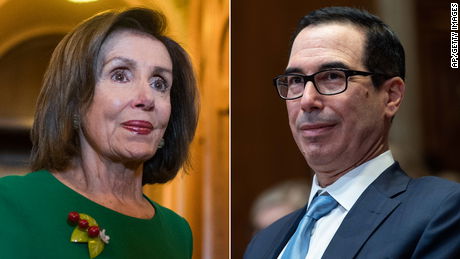Deadline looms for stimulus deal before Election Day with key differences unresolved

(CNN) -- Stimulus negotiators face a fast-approaching deadline to resolve key differences and deliver a sweeping coronavirus relief package to the American people before Election Day.
House Speaker Nancy Pelosi on Sunday set a Tuesday deadline for her and Treasury Secretary Steven Mnuchin to reconcile significant policy disputes if they want to pass a relief bill before November 3. That time frame brings enormous pressure for a fast breakthrough that will have implications for millions of Americans struggling with the fallout of a still-raging pandemic.
However, a deal has evaded negotiators for months as the Trump administration and Pelosi have been hundreds of billions of dollars apart on topline numbers -- as well as what should be included, and it's unclear if those key sticking points can be resolved before Pelosi's deadline.
Pelosi and Mnuchin, President Donald Trump's lead negotiator, spoke Saturday evening for more than an hour, with more negotiations expected Monday.
What needs to be resolved?
Pelosi's Tuesday deadline will bring to a head months of back and forth between the two parties and the Trump administration -- with the partisan majorities in both chambers passing or attempting to pass their own preferred legislation, only to have it rejected out of hand by the opposite side.
To this point, hold ups between Democrats' stimulus plan and the Trump administration include unemployment insurance, tax credits, child care funding and liability protections.
Pelosi said in a letter to Democratic colleagues Sunday, "while there was some encouraging news" with stimulus talks, "much work remains."
One major sticking point, she said, is the language the Trump administration sent to House Democrats concerning what would be funded for coronavirus testing under a stimulus agreement.
"The White House does not appreciate the need to direct resources to culturally competent contact tracing," Pelosi wrote.
"Instead of recognizing the need for a strategic plan, they have changed words including 'shall' to 'may,' 'requirement' to 'recommendation,' and 'strategic plan' to 'strategy.'"
"We are hoping to find common ground," she continued. "I am optimistic that we can reach agreement before the election. To that end, we are writing language as we negotiate the priorities, so that we are fully prepared to move forward once we reach agreement."
Another issue has been the President's own rhetoric. Trump abruptly shut down stimulus negotiations earlier this month, only to completely reverse his position days later, sign off on a larger $1.8 trillion topline number and tweet "Go big or go home" on stimulus funding.
Trump told reporters on Sunday night that the White House is working with Pelosi to pass a stimulus bill and said he would like to pass a package with a topline number that is "a bigger number than [Pelosi] wants."
It's unclear, however, if such a deal would pass the Republican-controlled Senate, a fact Trump appeared to acknowledge Sunday.
"I want to do it at a bigger number than she wants. That doesn't mean all the Republicans agree with me, but I think they will in the end," Trump said. "If she would go along, I think they would, too."
Meanwhile, Senate Majority Leader Mitch McConnell announced on Saturday there would be votes on stimulus measures, including a stand-alone Paycheck Protection Program bill to help small businesses, on Tuesday and Wednesday, though Democrats are expected to block McConnell's effort.
High stakes for millions of Americans
Negotiations would still continue after Tuesday if a deal isn't reached, but it wouldn't get done in time before Election Day which will carry adverse effects for millions of Americans.
The pressure to strike a deal this time has become increasingly urgent with unemployment levels elevated, an epidemic of small business closures, and the end of the direct payments and enhanced unemployment insurance that helped float families and individuals throughout the pandemic-created economic shutdowns.
The pending result, according to economists, could be devastating if Congress and the Trump administration do not reach an agreement.
Congress' swift and expansive response to the pandemic last spring spared millions of Americans from falling into poverty after losing their jobs. But now that the relief has ended, the poverty rate has risen in recent months, two new studies show.
In fact, without the additional federal help, more people -- particularly Black Americans, children and those with a high school education or less -- fell into poverty over the summer. The rate rose to 11.1% in September, according to the researchers, who have created a near real time dashboard.
"Our results show that for low-income individuals and families, the government response to the pandemic more than offset the sharp decline in earnings early on in the pandemic," the authors wrote. "However, these gains appear to have faded as some of the benefits expire."
The-CNN-Wire™ & © 2020 Cable News Network, Inc., a WarnerMedia Company. All rights reserved.